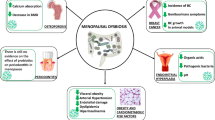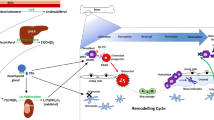Abstract
Introduction
Perimenopause is a time of transition in a woman’s life that links her reproductive years to the cessation of ovulation, or menopause. For many women, this time is characterized by a variety of physiological and lifestyle changes, including increasing irregularity in menstrual bleeding, frequency and severity of vasomotor symptoms, etc. Therapies evaluated specifically for the perimenopausal women are very limited. This study aimed to evaluate the effectiveness and safety of Amberen® (a succinate-based non-hormonal supplement) combined with a Smart B® (vitamin B) complex in women with typical (without complications) mild to moderate climacteric syndrome during perimenopause.
Methods
Women up to 50 years of age, in perimenopause, with vasomotor and psychosomatic symptoms of the climacteric syndrome were enrolled for the study. The trial was randomized, double-blinded, placebo-controlled, comparative, and prospective.
Results
A total of 106 participants were enrolled in the trial and, per protocol, 105 completed the trial. We observed statistically significant improvements in most of the Greene Climacteric Scale symptoms, State-Trait Anxiety Inventory (STAI), Hospital Anxiety and Depression Scale (HADS), and Well-being, Activity, and Mood (WAM) scores. The intervention was well tolerated with few adverse effects reported to be mild and transient.
Conclusion
The use of this dietary supplement is safe and eliminates or improves vasomotor and psychosomatic symptoms of climacteric symptoms in perimenopausal women: it improves sleep and cognitive abilities, lowers depression and anxiety, improves mood and well-being, and positively affects quality of life.
ClinicalTrials.gov Identifier
NCT03897738.




Similar content being viewed by others
References
Shifren JL, Gass ML, NAMS Recommendations for Clinical Care of Midlife Women Working Group. The North American Menopause Society recommendations for clinical care of midlife women. Menopause. 2014;21(10):1038–62. https://doi.org/10.1097/GME.0000000000000319.
Menopause Practice: A Clinician's Guide, 6th edn. ISBN 978-0-578-53228-8.
Harlow SD, Gass M, Hall JE, et al. Executive summary of the Stages of Reproductive Aging Workshop + 10: addressing the unfinished agenda of staging reproductive aging. Menopause. 2012;19(4):387–95. https://doi.org/10.1097/gme.0b013e31824d8f40.
Santoro N. The study of women’s health across the nation (SWAN). Obstet Gynecol Clin North Am. 2011;38(3):xvii–xix. https://doi.org/10.1016/j.ogc.2011.07.002.
Hale GE, Robertson DM, Burger HG. The perimenopausal woman: endocrinology and management. J Steroid Biochem Mol Biol. 2014;142:121–31. https://doi.org/10.1016/j.jsbmb.2013.08.015.
Martin VT, Pavlovic J, Fanning KM, et al. Perimenopause and menopause are associated with high frequency headache in women with migraine: results of the American migraine prevalence and prevention study. Headache. 2016;56(2):292–305. https://doi.org/10.1111/head.12763.
Jones HJ, Huang AJ, Subak LL, Brown JS, Lee KA. Bladder symptoms in the early menopausal transition. J Womens Health (Larchmt). 2016;25(5):457–63. https://doi.org/10.1089/jwh.2015.5370.
Santoro N. Perimenopause: from research to practice. J Womens Health (Larchmt). 2016;25(4):332–9. https://doi.org/10.1089/jwh.2015.5556.
Long SJ, Benton D. Effects of vitamin and mineral supplementation on stress, mild psychiatric symptoms, and mood in nonclinical samples: a meta-analysis. Psychosom Med. 2013;75(2):144–53. https://doi.org/10.1097/PSY.0b013e31827d5fbd.
Borges-Vieira JG, Cardoso CKS. Efficacy of B-vitamins and vitamin D therapy in improving depressive and anxiety disorders: a systematic review of randomized controlled trials. Nutr Neurosci. 2023;26(3):187–207. https://doi.org/10.1080/1028415X.2022.2031494.
Radzinsky VE, Uspenskaya Y, Shulman LP, et al. Succinate-based dietary supplement for menopausal symptoms: a pooled analysis of two identical randomized, double-blind, placebo-controlled clinical trials. Obstet Gynecol Int. 2019;2019:1572196. https://doi.org/10.1155/2019/1572196.
Radzinskii VE, Kuznetsova IV, Uspenskaya YB, et al. Treatment of climacteric symptoms with an ammonium succinate-based dietary supplement: a randomized, double-blind, placebo-controlled trial. Gynecol Endocrinol. 2016;32(sup2):64–8. https://doi.org/10.1080/09513590.2016.1232686.
Kuznetsova IV, Uspenskaya YB, Borisova MI, et al. Effectivnost alternative therapy u zhenshchin v perimenopause i postmenopause [Efficiency of alternative therapy in perimenopausal and postmenopausal women]. Obst Gynecol. 2016;5:126–33. https://doi.org/10.18565/AIG.2016.5.126-133. (In Russian).
Greene JG. Guide to the Greene climacteric scale [thesis]. Glasgow: University of Glasgow; 1991.
Greene JG. Constructing a standard climacteric scale. Maturitas. 2008;61(1–2):78–84. https://doi.org/10.1016/j.maturitas.2008.09.011.
Spielberger CD, Gorsuch RL, Lushene RE. Manual for the state-trait anxiety inventory. Palo Alto: Consulting Psychologists; 1970.
Zigmond AS, Snaith RP. The hospital anxiety and depression scale. Acta Psychiatr Scand. 1983;67(6):361–70. https://doi.org/10.1111/j.1600-0447.1983.tb09716.x.
Doskin VA, Lavrent’eva NA, Miroshnikov MP, et al. Test differencirovannoj samoocenki funkcional’nogo sostoyaniya [Differentiated Self-Learning Test of Functional State]. Voprosy Psihol. 1973;6:141–5 (In Russian).
Chen TT, Maevsky EI, Uchitel ML. Maintenance of homeostasis in the aging hypothalamus: the central and peripheral roles of succinate. Front Endocrinol (Lausanne). 2015;6:7. https://doi.org/10.3389/fendo.2015.00007.
Maevsky EI, Peskov AB, Uchitel ML, et al. A succinate-based composition reverses menopausal symptoms without sex hormone replacement therapy. Adv Gerontol. 2008;21(2):298–305.
Millington GW. The role of proopiomelanocortin (POMC) neurones in feeding behaviour. Nutr Metab (Lond). 2007;4:18. https://doi.org/10.1186/1743-7075-4-18.
Peskov AB, Maevskii EI, Uchitel’ ML, et al. Succinate-based preparation alleviates manifestations of the climacteric syndrome in women. Bull Exp Biol Med. 2005;140(3):312–4. https://doi.org/10.1007/s10517-005-0476-y.
Acknowledgements
All authors would like to acknowledge the invaluable support and assistance of Ms. Anna Skylar in the development and creation of this manuscript. Ms. Skylar is a scientific affairs manager in Alliance Pharmaceuticals Ltd.
Funding
Amberen® was manufactured by Biogix Inc. during the study period, and the company funded the clinical trial including active and placebo products. The journal's rapid service fee was funded by the Alliance Pharma Inc.
Author information
Authors and Affiliations
Contributions
There was substantial contribution from all authors to this article: Vera A. Kachko and Lee P. Shulman conception, data analysis, and interpretation, writing and reviewing. Irina V. Kuznetsova, Yulia B. Uspenskaya and Denis I. Burchakov data analysis, interpretation and reviewing. The final version of the article has been approved by all authors.
Corresponding author
Ethics declarations
Conflict of Interest
Vera A. Kachko is a scientific advisor in Alliance Pharmaceuticals Ltd., Lee P. Shulman is a consultant for Alliance Pharmaceuticals Ltd. Lee P. Shulman is an Editorial Board member of Advances in Therapy. Lee Shulman was not involved in the selection of peer reviewers for the manuscript nor any of the subsequent editorial decisions. Irina V. Kuznetsova was the main investigator of this trial, Yulia B. Uspenskaya and Denis I. Burchakov were investigators in this trial.
Ethical Approval
The trial was conducted according to the principles of the World Medical Association Declaration of Helsinki “Recommendations guiding physicians in biomedical research involving human subjects” (accepted in 1964, last updated in 2000, with explanations added in 2002, 2004, 2010, and 2013) and the National Standard of the Russian Federation “Clinical practice” (52379–2005, 27.09.2005, No 232-SP). Protocol of the trial, independent review committee (IRC), informed consent form, and other documents were presented and approved by the Ethics Committee of I.M. Sechenov Moscow State Medical University for independent expert analysis (Protocol excerpt No. 04-19, Local Ethics Committee session March 6, 2019). Informed consent forms signed and dated by study subjects indicate their agreement to participate in the study.
Rights and permissions
Springer Nature or its licensor (e.g. a society or other partner) holds exclusive rights to this article under a publishing agreement with the author(s) or other rightsholder(s); author self-archiving of the accepted manuscript version of this article is solely governed by the terms of such publishing agreement and applicable law.
About this article
Cite this article
Kachko, V.A., Shulman, L.P., Kuznetsova, I.V. et al. Clinical Evaluation of Effectiveness and Safety of Combined Use of Dietary Supplements Amberen® and Smart B® in Women with Climacteric Syndrome in Perimenopause. Adv Ther (2024). https://doi.org/10.1007/s12325-024-02910-0
Received:
Accepted:
Published:
DOI: https://doi.org/10.1007/s12325-024-02910-0




